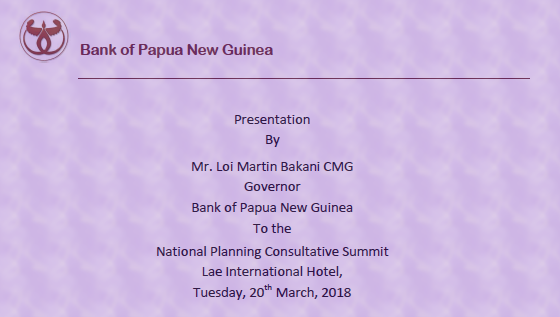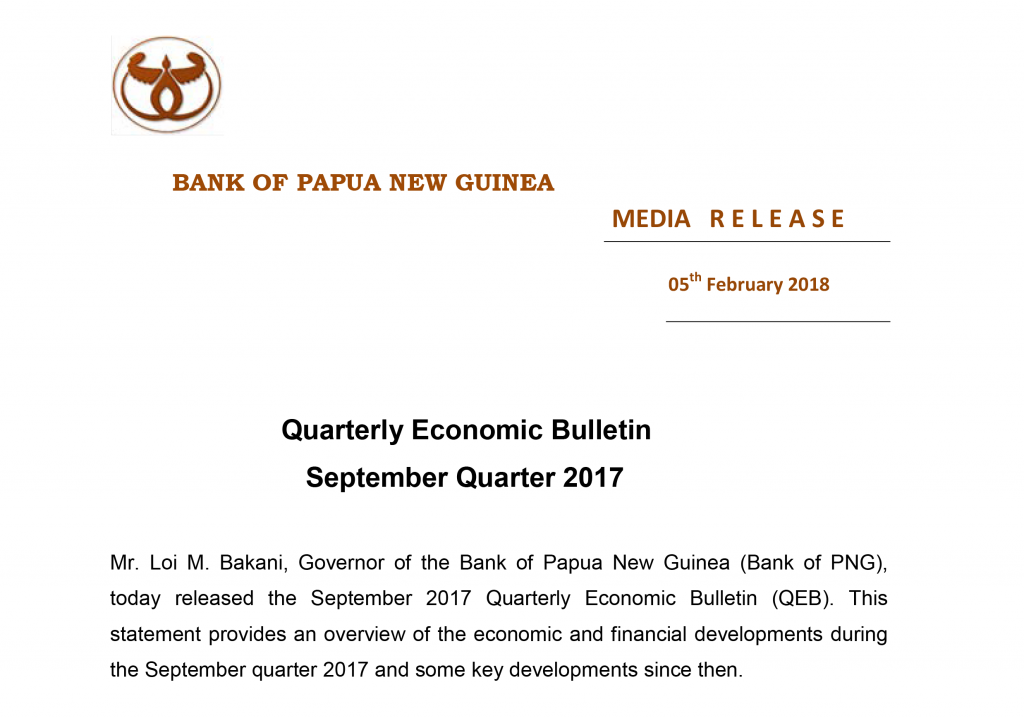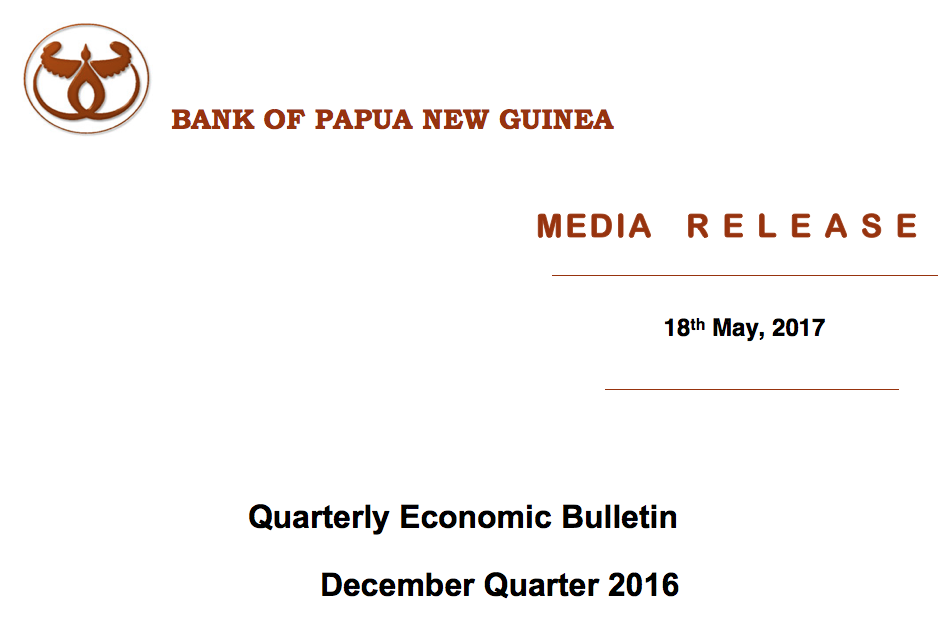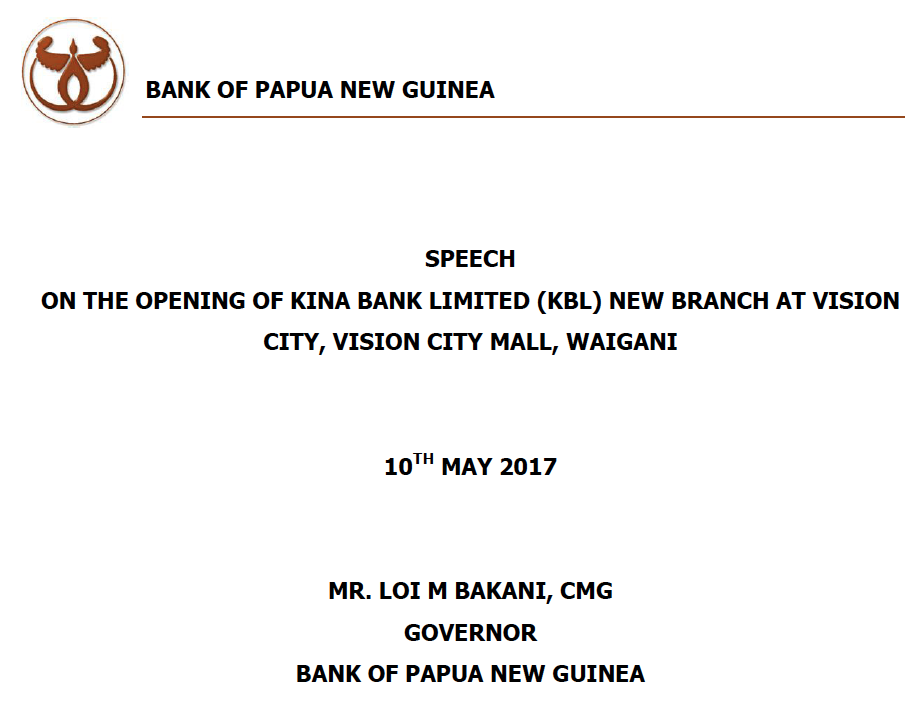Releases
Presentation by Loi M Bakani CMG Governor, Bank of Papua New Guinea to the National Planning Consultative Summit
Blockchain Technology and Financial Inclusion Seminar – Closing Speech by Minister for Communication & Information, Hon. Minister Francis Maneke, MP Talasea.
ACKNOWLEDGEMENTS:
- Mr Loi Bakani, Governor, Bank of Papua New Guinea
- Mr. Rod Hilton, Minister Counsellor, Australian High Commission
- Mr. Paulias Korni, Secretary, Department of Communication & Information
- Dr. Gae Kauzi, Deputy Governor, Bank of Papua New Guinea
- Mrs. Elizabeth Genia, Assistant Governor, Bank of Papua New Guinea
- Members of the Diplomatic Corp
- Esteemed Speakers
- Distinguished Guests
- Members of the Media
Good afternoon ladies and gentlemen.
I am honored to join you all, in my capacity as Minister for Communication & Information, in closing this inaugural conference on Blockchain Technology and Financial Inclusion.
Ladies and gentlemen,
Our nation’s development roadmap – Vision 2050 – commits us to becoming a smart country, and to aspire to improving our human development indicators.
I believe that blockchain technology offers us the potential to do both of these things, while accelerating our economic development, and helping other nations do the same.
When we talk about being a smart nation, we’re talking about innovation, and problem solving.
Coming from a remote agricultural province, I know firsthand the challenges faced by our rural majority.
- Many people don’t have identification documents, making it difficult to open bank accounts and participate in civic life.
- Financial services are difficult to access beyond our provincial capitals, making it hard to get credit and send money over long distances.
- And customary land is usually unregistered, making it difficult to develop for commercial purposes.
As you all know, these are just three of the challenges which the blockchain can be applied to.
This makes Papua New Guinea an ideal proving ground for these applications.
In fact, there is a possibility that we will leapfrog many developed nations in our use of this sort of smart technology, giving us a competitive edge as early adopters.
Papua New Guineans are very open to new ideas, and new technologies. Just look at how quickly mobile phones have spread, and become a part of everyone’s lives.
We are also natural traders, with our ancestors exchanging items of value – food, tools, betel nut – for hundreds of year.
Indeed, bitcoin is not such a difficult concept for people who used kina shells as currency. Even today, people in East New Britain respect shell money as a store of value and a means of trade.
I’d like to pay tribute to the Bank of Papua New Guinea, and Governor Bakanai, for being at the forefront of this nation’s adoption of blockchain technology, particularly in relation to financial inclusion.
Participants have heard during this conference about the bank’s R&D agenda which resulted in the successful pilot of a new blockchain-based identity solution.
The IDbox, developed with the support of the Australian Government, is an exciting innovation that uploads a person’s identity to the blockchain without mains electricity or internet connectivity.
In the future, the box could be used to enable inexpensive funds transfers outside the banking system.
So someone in a remote district could go to the store and buy rice, soap and other goods with funds sent – at virtually no cost – from a family member in Port Moresby.
It is these sorts of really transformative innovations that can change people’s lives – particularly in a nation like ours, in which 85 per cent the population is outside the banking system.
I’d also like to congratulate Governor Bakani on his launch of the PNG Digital Commerce & Cryptocurrency Association, which brings together a wide range of stakeholders to identify emerging opportunities, and advise government on regulatory issues.
As the Prime Minister reiterated just yesterday, our government is committed to strengthening the national identity system, and will be sending an envoy to India to look at using biometric data.
When we look at securing this sort of information, we must consider the advantages that blockchain technology has to offer.
Likewise, the government has committed in the Second Alotau Accord to continuing the digitisation of land assets and voluntary registration of customary land.
The blockchain offers a robust and secure technology to ensure the accuracy of land information, and the validity of transactions.
Another potential application is in the area of so-called “smart contracts”, which can enable the tracking of funds – like services improvement program funds – in a more transparent manner, without leakage along the way.
In my own ministry, I am determined to support new “e-government” solutions that will deliver greater efficiency in the way public funds are spent.
This is something that we will be looking at in our APEC discussions next year, with a view to aligning our own systems and policies with those of our regional partners.
The upgrading of our broadband infrastructure will, over time, improve the enabling environment for these sorts of reforms.
These are exciting times for Papua New Guinea, and for blockchain innovators.
I’d like to thank all of the participants in this conference for applying their skills and creative vision to addressing the development challenges of this nation, in partnership with our core institutions like the Bank of Papua New Guinea.
I’d also like to thank our friends from the Australian Government, who are working in partnership with our own Government agencies, like the Central Bank, to strengthen economic development.
We in the O’Neill Government are determined to bridge the digital divide, to ensure our people can participate in the global economy, not be excluded from it.
Speech by Mr. Norbert Mumba – Deputy Executive Director, AFI at the 3rd Pacific Islands Regional Initiative (PIRI) Leaders Roundtable.
Speech by Mr. Norbert Mumba – Deputy Executive Director, AFI
at the 3rd Pacific Islands Regional Initiative (PIRI) Leaders Roundtable. Kokopo, Papua New Guinea, 2017
Honorable Senior statesman and former Prime Minister of PNG, Sir Rabbie Namaliu
Mr. Denton Rarawa, Governor, Central Bank of Solomon Islands and PIRI Chair
Mr. Simeon Athy, Governor, Reserve Bank of Vanuatu and PIRI Co-Chair
Mr. Loi Bakani, Governor, Bank of Papua New Guinea and Host of the 3rd PIRI Leaders Roundtable
Governors of the Pacific Islands Regional Initiatives
Deputy Governors of the Pacific Islands Regional Initiatives
Partners, international experts and stakeholders
Distinguished Guests
Ladies and Gentlemen
Thank you for the very warm welcome and reception. It is a great pleasure for me to be here with you all in this beautiful city of Kokopo in the East New Britain Province of PNG. Permit me to briefly express my gratitude to Governor Bakani and his excellent staff at the Bank of Papua New Guinea. We appreciate all your efforts in hosting and organizing this important regional initiative meeting for the Pacific and the AFI network. Organizing such events is not an easy task and I congratulate you all on a job well done.
I would like to make special mention of our member who have travelled all the way from Seychelles to attend this meeting – Deputy Governor Jenifer Sullivan and team from Central Bank of Seychelles, welcome. As a small island, we hope that the lessons you will learn from this gathering will contribute to the knowledge of policy innovation that the CBS cab utilize to champion the cause of financial inclusion.
The Executive Director of AFI, Dr. Alfred Hannig, who cannot be here with us today, due to other pressing issues of the AFI network, has charged me to express his kindest regards to all of you who are taking part in this PIRI Leaders’ Roundtable.
The Pacific Islands is one of the most committed region to achieve greater financial inclusion in the world. Policy priorities in the region have been catered to facilitate the access of the lowest-income populations to financial services with the aim of creating conditions that really empower these groups to reach greater financial inclusion. Since its launch in 2015 in Dili, Timor Leste, the regional initiative has unlocked a resilient and long-term prospect for member institutions to share a common vision, while safeguarding the furtherance of efforts to scale up financial inclusion in the Pacific Islands. I am happy to note that the initiative through the seven member institutions have continued to implement innovative policy solutions that address the issues highlighted in the Dili Consensus on financial inclusion in the Pacific.
2016 was an exciting year for members of PIRI and I am happy to share some of the notable achievements of PIRI members including 2017:
• The hosting of AFI’s flagship event, the Global Policy Forum in Nadi, Fiji with adoption of the Denarau Action Plan.
• The recognition of the region’s achievements has grown within the AFI network, and as you may be aware, the Pacific is the only region to have won the prestigious Maya Declaration Awards twice, with awards going to the Reserve Bank of Fiji in 2013 and the National Reserve Bank of Tonga in 2016, congratulations.
• The completion of Demand Side Surveys (DSS) for Fiji, Solomon Islands, Samoa, Tonga and Vanuatu including the completion and publication of the survey findings on SMEs for Vanuatu in 2017. The data from the DSS surveys are important particularly in designing policy solutions for financial inclusion that are evidence-base.
• Development of National Financial Inclusion Strategies (NFIS) for Samoa, Fiji, Solomon Islands, Papua New Guinea, Timor Leste and with expected strategies from Tonga and Vanuatu.
Ladies and gentlemen,
The theme for the 3rd PIRI Leaders Roundtable is “Digital Financial Services in the face of De-risking”, with discussions being held under the overarching theme of Digital Financial Services and technology. This theme is timely for the entire region as the issue on de-risking has had serious repercussions in the lives of Pacific islanders. However, there is opportunity for new business models in the pacific.
Remittance services using traditional transfer agents is the key service affected by de-risking in the Pacific. Regional regulators should encourage the private sector for new “business models” for providing remittance services without the use of a transfer agent. It may be that the age of the traditional Western Union money transfer agent is now coming to an end. We need to look at how other technology solutions can be used to facilitate remittance services to the islands, and pacific regulators need to be open minded in providing the enabling regulatory environment to support these new innovations. I see great opportunity for this.
In its 2015 report, GSMA noted that the mobile ecosystem in the Pacific Islands was directly responsible for driving major economic progress and welfare. The reported highlighted that in 2014, mobile technology was responsible for 4.7% of the region’s GDP, representing nearly US$2 billion in value added terms. The mobile ecosystem directly accounted for more than a third of that value, with indirect and productivity impacts accounting for the rest. Mobile services are increasingly seen as a driver of socio-economic development in the region, particularly in the areas of financial inclusion, disaster preparedness and response, and bridging the gender gap.
Over the next two days, we will explore a range of topics, including:
• Digital Financial Services (DFS) in the Pacific and deepening the discussion around the barriers and enablers;
• De-risking in the Pacific – is there a regional solution? If so, what can PIRI do and the experience that we can share with the AFI network;
• Green Finance and Financial Inclusion;
• National Financial Inclusion Strategies and the challenges and lessons learnt from implementation;
• Women Empowerment in the Pacific with discussion around what the PIRI members are undertaking in implementing the Denarau Action Plan;
• Enhancing MSMEs access in the Pacific, the Role of Technology.
This leader’s roundtable will provide the platform for members and stakeholders the opportunity to share their experiences and learning from respective experiences in our work in building a more inclusive regional community as indeed we share a similar vision where financial services are accessible by all Pacific Islanders. I am confident that, at the end of this meeting, we will all walk away with new insights and ideas to set PIRI on a stronger path of deepening financial inclusion across the region and contributing to inclusive economic development in Pacific Island countries.
Ladies and Gentlemen,
The world in 2017 presents us with global challenges to the ideas of globalization and open exchanges: Waves of isolationism – Threat or opportunity? AFI will continue to be a champion for a global sharing community, and we will continue to show the value of this approach through our actions.
In that light, let me give you a few updates about the current work in the AFI network:
• We are working to strengthen the ties of the AFI network through new initiatives and offices. The regional office for Africa was formally launched at the AMPI regional event in Maputo announcing the bid going to the Ministry of Finance and Banque centrale des États de l’Afrique de l’Ouest (BCEAO. The bidding for the LAC office will close at the end of April 2017 and the process will be completed by August 2017.
• Regional Initiatives: We will be launching the Financial Inclusion in the Arab Region Initiative (FIARI) at the 2017 GPF in Egypt which will add to the other initiatives within the network (AMPI, PIRI and FILAC)
• We are expanding our PPD partnerships and trainings. In the last three working group meetings in Ghana, Seychelles and Tajikistan, including the AMPI event, VISA and mastercard provided trainings specific to member’s needs. I am also happy to note the presence of VISA in this meeting and I hope that they would be able to develop a training schedule for the Pacific based on the needs that will be provided by the experts group.
• We are expanding our important work on financial inclusion and gender, and following through on the priorities laid out in the Denarau Action Plan.
• We are seeing great progress with our Maya Declaration commitments. The Maya Declaration continues to be an inspiration across and beyond our network and I encourage you to build this into your work streams.
And as always, we are continuously looking at developing trends in financial inclusion and incorporating them within our policy work.
• Fintech: members endorsed proposal peer learning on Fintech/Regtech, now under preparation.
• Forcibly Displaced People workshop with the G20 on 26 April in Berlin – outcome report and we need members with experience to share their views
• Climate Change and Financial Inclusion (“Green Finance”)
Ladies and Gentlemen,
Allow me to share with you my excitement about the upcoming 2017 AFI Global Policy Forum- the first to ever be held in the Arab region. Under the theme “Exploring Diversity, Promoting Inclusion” we are now working closely with Central Bank of Egypt to create a milestone event for financial inclusion. Official dates for the GPF are 13-15 September 2017 in Sharm-El-Sheikh, with the Regional Initiatives and Working Groups meeting set to take place the 11-12 September. We expect this to be the largest GPF- and largest event to ever be held by AFI- and most certainly, the working groups will play a key role in its success.
Before I close, I would be remiss if I did not acknowledge the efforts and contributions of our partners and friends. In particular, I wish to recognize the Pacific Financial Inclusion Programme (PFIP) who funded and provided intellectual partnership for the realization of PIRI in its birth. We look forward to PFIP’s continued support to PIRI and its members.
85% of the worlds unbanked live in a country with an AFI institution.
This is our mandate and our obligation. The challenge before us is enormous. Indeed, it is a challenge beyond any one of us to conquer. But we are not alone. AFI’s strength is its members, its partners, and its supporters. Over 100 institutions, more than 90 countries working within an independent member-led institution.
And so, I return to our theme. “Digital Financial Services in the face of De-risking”. Let this be your guide as we spend the next day’s sharing financial inclusion lessons and knowledge here in Kokopo.
On that note, my deepest appreciation to Governor Loi Bakani and the team from BPNG for the excellent arrangements in hosting the 3rd Pacific Islands Regional Initiative (PIRI) Leaders Roundtable here in the beautiful surroundings of Kokopo. I look forward to a fruitful and productive deliberations.
Thank you very much for your time and attention
Loi M. Bakani CMG, Governor of the Bank of Papua New Guinea, today released the December 2016 Quarterly Economic Bulletin (QEB)
Mr. Loi M Bakani, CMG Governor speech on the Opening of Kina Bank Limited (KBL) New Branch at Vision City
Press Release on Money Schemes/Scams
Public Notice on Email Scam
Closing Speech by Governor Bakani at the MiBank Esa’ala Agents Training Graduation Ceremony
CLOSING SPEECH
by
GOVERNOR MR LOI M. BAKANI, CMG
At the
MiBANK ESA’ALA AGENTS TRAINING GRADUATION CEREMONY
26 AUGUST 2016
Good afternoon and thank you for the invitation.
Extending financial services to the people especially to women and youth is what I wanted to encourage in PNG and I am grateful to see it grow with our partner financial institutions.
We started this journey knowing that we have a population of over 8 million people, 80 percent of which live in the rural areas, so isolated like Esa’ala and in the Highlands region where there are no financial services available.
In 2009 and 2010 we had only one licensed micro bank and I wanted to create second tier financial institutions to cater for the little people, defined as small income earners.
We started the Wau Micro Bank as a pilot project, and due to high demand for financial services, mainly deposits and loans, the Central Bank licensed them as a financial institution. This bank is now called MiBank. Since then we now have 5 micro banks, one of them is the Women’s Micro Bank, purposely to serve women.
As business entities, financial institutions find it costly to open branches or sub-branches in rural areas. So when you have any of these bank agencies in rural areas you must look after them, take ownership and keep maintaining them so that they can continue to provide the services that you need.
Together with our partner financial institutions in PNG, we are driving financial literacy trainings. And as trainers you must go out to your areas and teach people how to save and where to save. We are targeting women and I am very happy that this training is targeted to women and youths.
I made a commitment in 2013 to reach 1 million new bank accounts, and 50% of that will be for women. We are close to attaining this goal.
We are also targeting children through our “Young Minds Savings Campaign” by teaching them the basics of how to save money and budget, and that there are licensed and regulated financial institutions that they can use to save for their future. The campaign is conducted together with our partner financial institutions through visitation to schools, and we assist them in opening new bank accounts. MiBank and the other partner financial institutions have been partnering with us with these training.
In July this year we hosted a Financial Inclusion Expo in Mt Hagen, and we had a record of over 30,000 people that attended the 2 days expo. We brought together all financial institutions and other partner institutions like mobile phone companies, to showcase their products and other services for the people to learn about and help them open new bank accounts. Financial Literacy sessions were also conducted by these stakeholders on their respective products/services, in addition basic themes on savings, loans, budgeting and investments.
There are many new products that financial institutions offer, but given the geographical features of our country, mobile phone banking appears to be the best option to reach our rural unbanked population.
The Honourable member for Esa’ala, Mr. Davis Steven has done the right thing by approaching the right institution to conduct this training for you. Given the commitment and drive already shown by the Esa’ala community, I believe there will be more positive changes in the area and to people’s lives. This is the start of a journey for you women of Esa’ala and youths of Alotau. I urged you to stay focus on this journey.
I have a big ambition to plan for a financial inclusion exposition by sea for this maritime province. We are at the preliminary stage of our plan to host the expo and we will be talking to the Governor of the province and his provincial administration to make sure this plan is carried out.
Finally, my congratulations to you all the participants in this training conducted by MiBank. I urge you to take back what you have learnt and continue the training in your respective communities. I would also like to thank MiBank for being a very strong partner in the drive for Financial Inclusion and we will continue this partnership as we go forward in providing financial literacy and education training to the people of this country.
Thank you and God bless.
Financial Inclusion Expo aims unbanked population in Highlands Region
P R E S S R E L E A S E
Financial Inclusion Expo aims unbanked population in Highlands Region
It is not often that you get all financial institutions together in one place with people in the community however, that was accomplished by the Bank of Papua New Guinea (BPNG) in Mt Hagen, Western Highlands Province recently.
Over 20 financial institutions, telecommunication companies, financial education partners, NGO’s and other stakeholders were part of the 2016 Financial Inclusion Exposition that was held in Mt Hagen on the 15th and 16th of July.
Participating organizations took time to talk to the public about the financial products and services that they have, assisted the public in opening new accounts and financial literacy and education training during the expo.
Bank of PNG Governor, Mr Loi Bakani while officially opening the two day event, mentioned that BPNG is driving financial inclusion to help 70-80% of the people in the country who do not have access to any form of financial services. It has also established the Centre for Excellence in Financial Inclusion (CEFI) dedicated to undertake financial inclusion programs.
He further stressed that the aim of the Government and the Central Bank is to reduce the percentage of people who are unbanked in the country so that the people can access financial services available and contribute meaningfully to economic growth and improve their wellbeing.
The Governor also urged participating institutions to continue to provide financial literacy training to the people, especially those in rural areas so that people become aware of the various financial products and services provided by the financial institutions. They also need to be knowledgeable about better ways to budget and save, and generally to have the correct attitudes towards managing money.
Governor added that while that is the aim of both the Government and the Central Bank, it is also important for the public to know that bringing financial services and products to them is costly and urged them to take care of the services that are being provided.
People from all over highlands region converged at Queen Park oval where financial institutions were taken to task listening to and attending to queries from the public regarding their products and services. People visited various stalls to collect information, identify the most suitable financial services and attend financial training.
Official tally taken during the expo indicated an increase in the number of women attendees in the expo among the total of 30,432 registered at the gates. This number is the highest compared to other expositions that were hosted previously by BPNG.
Authorised by: Loi M Bakani, CMG
GOVERNOR




